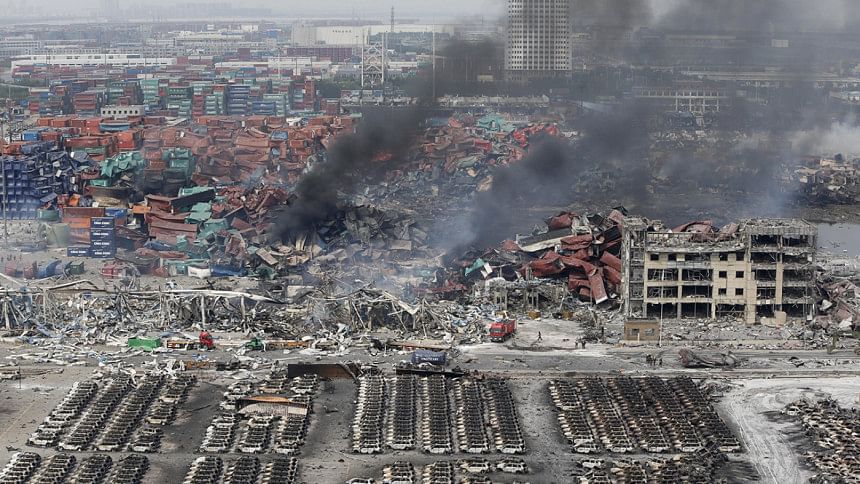China orders evacuation of blast area

The Chinese authorities have ordered the evacuation of residents within a 3km radius of the Tianjin blast site over fears of chemical contamination.
The evacuations came after an apparent change in wind direction, and as police confirmed the highly toxic chemical sodium cyanide was found near the site.
A man was found alive 50m from the blast core, Xinhua news agency said.
Eighty-five people are now known to have died in the giant blasts in the north-east Chinese port of Tianjin on Wednesday.
Latest pictures of the aftermath
People sheltering at a school used as a safe haven since the disaster have been asked to leave wearing masks and long trousers, reports say.

The order came after the wind apparently changed direction, prompting fears that toxic particles that would have previously been blown out to sea could be blown inland.
Anti-chemical warfare troops have entered the site.
The People's Daily newspaper tweeted that they had been sent to handle highly toxic sodium cyanide which had been found there.
The discovery was confirmed by police "roughly east of the blast site" in an industrial zone, state-run Beijing News said.
Officials had until then only confirmed the presence of calcium carbide, potassium nitrate and sodium nitrate. Calcium carbide reacts with water to create the highly explosive acetylene.
Officials have so far insisted that air and water quality levels are safe.
What is sodium cyanide?
The chemical sodium cyanide is white crystalline or granular powder which can be rapidly fatal if inhaled or ingested, as it interferes with the body's ability to use oxygen.
It is mostly used in chemical manufacturing, for fumigation and in the mining industry to extract gold and silver.
It is soluble in water, and absorbs water from air, and its dust is also easy to inhale. When dissolved or burned, it releases the highly poisonous gas hydrogen cyanide.
Potent chemical mix behind blasts
The questions being asked by Chinese citizens
'Like the end of the world': Residents' stories
Some fires have continued to smoulder and at least one reignited on Saturday. Xinhua said several cars at the site had "exploded again".
Of the 721 people injured, 25 are in critical condition and 33 are serious.
At least 21 firefighters are among the dead and an unknown number remain missing.

Dozens of relatives of the missing tried to disrupt a news conference given by officials on Saturday, demanding to know the fate of their loved ones.
"We have gone to each and every hospital by ourselves and not found them," Reuters news agency quoted Wang Baoxia, whose elder brother is missing, as saying.
"There is no government official willing to meet us. Not even one."
Water factor?
Fire officials have defended the actions of the team who responded to the initial report of a fire on Wednesday night, amid suggestions that using water on some of the chemicals could have led to the blasts.
Calcium carbide reacts with water to create the highly explosive acetylene.
Fire department official Lei Jinde said: "We knew there was calcium carbide inside but we didn't know whether it had already exploded. At that point no-one knew, it wasn't that the firefighters were stupid."
They would not have sprayed water on calcium carbide, he said, although he admitted it was a large warehouse and the team could not be sure where that substance was.
Chemical experts suggest an acetylene blast could then have detonated ammonium nitrate causing a much larger blast.

There were two explosions. The first was equivalent to about three tons of TNT, the second - some 30 seconds later - was equivalent to 21 tons.
The operators of the Tianjin site have been accused of violating safety rules.
The Chinese government has ordered officials to make nationwide checks on dangerous chemicals and explosives and to "crack down unwaveringly on illegal activities to ensure safety".

 For all latest news, follow The Daily Star's Google News channel.
For all latest news, follow The Daily Star's Google News channel. 



Comments